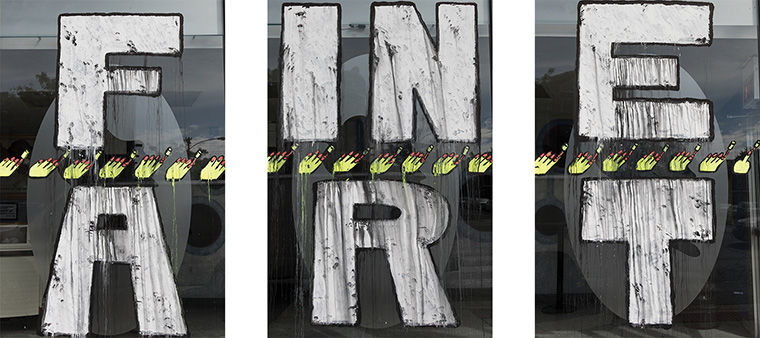‘Fine art’ definition looms over court case
Beauty Bar, a small venue in Chicago, painted the words “Fine Art” on its windows in response to Cook County demanding back taxes. The Cook County Board of Commissioners said rock, rap, and DJs are not fine art, therefore making the Beauty Bar and other small venues not eligible for a fine art amusement tax exemption. 1444 W. Chicago, Ave., Aug. 31.
September 6, 2016
Two small Chicago venues are trapped in a legal battle that has ignited a debate about the definition of “fine art,” and the resolution will determine whether the owners owe years of taxes.
The Cook County Board of Commissioners is demanding Evil Olive, 1551 W. Division Ave., and Beauty Bar, 1444 W. Chicago Ave., pay six years’ worth of back taxes. According to Cook County spokesperson Frank Shuftan, the case was filed in August 2015.
The Cook County code of Ordinances exempts venues holding 750 people or fewer from paying a 3 percent amusement tax if the hosted events are “live theatrical, live musical or other live cultural performances” that could be considered fine art.
According to an Aug. 22 Chicago Tribune article, during a hearing that took place on the same date, administrative judge Anita Richardson said, “I think you’re going to be hard-pressed to prove that the [county] commissioners meant for rap music to qualify as the fine arts.”
After Richardson’s statement gained attention, Shuftan said music venues should not fear for the future as long as they pay necessary taxes.
“This is an issue of tax collection—not trying to shut down venues,” Shuftan said. “It is not an issue of trying to determine what kind of music people should or shouldn’t be listening to.”
However, the Cook County Commissioner John Fritchey believes music venue operators’ fears are justified.
“This is as much about giving venue operators a sense of certainty and knowing what they [owe] taxes for as it is about making sure government doesn’t sit in the role of deciding what is music,” Fritchey said.
Fritchey’s office introduced an amendment to clarify the situation and ease business owners’ fears, according to an Aug. 29 press release from Fritchey’s office.
Fritchey will formally introduce it at a county board meeting Sept. 14, the release stated.
“It’s important that we have a sense of certainty going forward,” Fritchey said.
Mark George, the president of the Music Institute of Chicago, thinks the situation may be more complex, noting the ambiguity surrounding the term “fine art.”
“It is very difficult to say what is fine art and what isn’t—especially at a distance,” George said. “People in the public realm really need to expand their definition of what art and culture can be because we’ve changed as a city—as a country.”
The next hearing is Oct. 17. Beauty Bar and Evil Olive could not be reached for comment.








